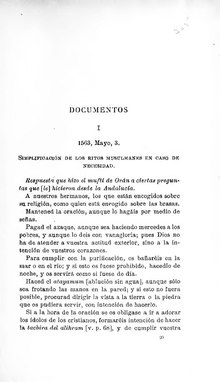
Back فتوى وهران Arabic Fetua de Orán Spanish Fatwa d'Oran French Fatwa Oran ID Fatwa Wahran Malay Fatwa van Oran Dutch Оранская фетва Russian فتوی وہران Urdu
| Oran fatwa | |
|---|---|
 A 1915 Spanish translation of the fatwa | |
| Created | 1 Rajab 910 AH (c. 8 December 1504 CE) |
| Location | Extant copies (including translations) kept in:
|
| Author(s) | Ahmad ibn Abi Jum'ah |
| Subject | Relaxations of sharia requirements for Spanish Muslims who were forced to become Christians, when necessary to survive |
The Oran fatwa was a responsum fatwa, or an Islamic legal opinion, issued in 1502 to address the crisis that occurred when Muslims in the Crown of Castile, in present-day Spain, were forced to convert to Christianity in 1500–1502.[1] It was authored by a maliki mufti Ahmad ibn Abi Jum'ah, an Algerian scholar of Islamic law of the Maliki school;[2] the term "Oran fatwa" was applied by modern scholars, due to the word "Al-Wahrani" ("of Oran") that appears in the text as part of the author's name.[3]
The fatwa sets out detailed relaxations of sharia (Islamic law) requirements, allowing Muslims to conform outwardly to Christianity and perform acts that are ordinarily forbidden in Islamic law, when necessary to survive.[4] It includes pliable instructions for fulfilling the ritual prayers, the ritual charity, and the ritual ablution, and recommendations when obliged to violate Islamic law, such as worshipping as Christians, committing blasphemy, and consuming pork and wine.[5]
The fatwa enjoyed wide currency among Spanish Muslims and Moriscos—Muslims nominally converted to Christianity and their descendants; one of its surviving aljamiado translations was dated at 1564, six decades after it was first issued.[6] The fatwa has been described as the "key theological document" to understand the practice of Spanish Muslims following the Reconquista up to the expulsion of the Moriscos in the early 17th century.[1][4]
The influence of the Oran fatwa was limited to Spain:[6] Outside the Iberian Peninsula, the predominant opinion upheld the requirements of Islamic law and required Muslims to emigrate, or even choose martyrdom, when the orthodox observance of the religion became impossible.[6][7]
- ^ a b Harvey 2005, p. 60.
- ^ Stewart 2007, p. 296.
- ^ Stewart 2007, p. 273.
- ^ a b Stewart 2007, p. 266.
- ^ Harvey 2005, pp. 61–62.
- ^ a b c Harvey 2005, p. 64.
- ^ Rosa-Rodríguez 2010, p. 152.